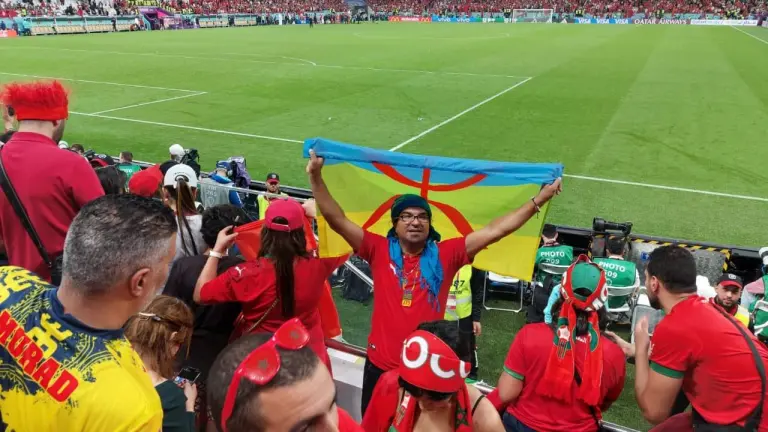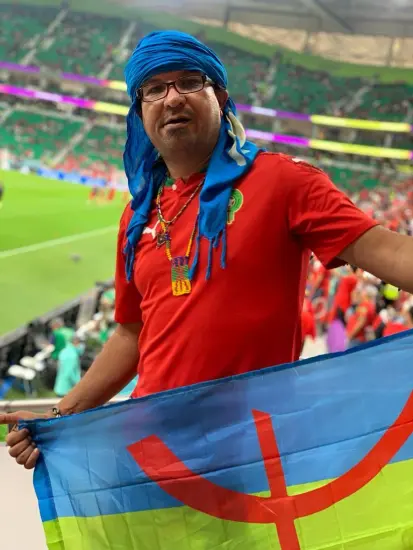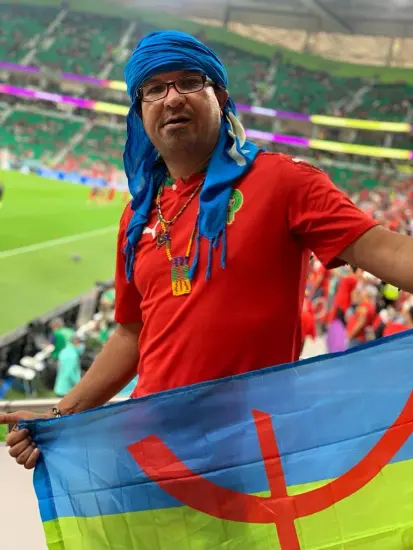“Azanzar,” the ambassador of the Amazigh culture in sports stadiums: Qatar banned the Amazigh language in its stadiums

The name of the loyal fan of the Hassania Agadir team and the Moroccan national team, Abdallah Ait Al-Siddiq, known in sports circles as “Azanzar”, re-emerged during the World Cup, which was hosted by the State of Qatar from November 20 to December 18, 2022, and was won by the Argentine national team.
Similar to the international, continental and local sports events, the Amazigh fan caught the eye in the “World Cup Qatar” by carrying the flag, the Amazigh symbols and the “Tifinagh” letters, and introducing the Amazigh language in a global event, which witnessed the participation of sports fans from different countries of the world, and the “Atlas Lions” achieved a historic achievement by reaching Golden Square as the first African team.
Azanzar was scheduled to travel from Agadir to Qatar before the World Cup through a group of European countries in order to introduce Amazigh and African culture in general and the cultural and tourism qualifications that Morocco abounds in, but the lack of support and contribution to the success of the “Ambassador of Amazigh Culture” initiative prevented the To complete this “dream” that he had and worked hard to achieve it.

The Hassani fan, who is known for carrying the Amazigh flag and symbols in local and international sports stadiums, was subjected to a series of harassment and confiscation of the Amazigh symbols by the Qatari authorities and preventing them from entering the stadiums under the justification of “prohibited things.”
The ambassador of the Amazigh culture in sports stadiums confirmed, in an interview with “The Amazigh World,” that “the Qatari security authorities banned everything that symbolizes the Amazigh symbols in their stadiums,” adding that they “prevented Moroccan fans from bringing the Amazigh flag into the stadiums that hosted the matches of the Moroccan national team and confiscated it.” ".
?Tell us about the constraints and challenges you faced in Qatar as a fan of Amazigh symbols
Before traveling to any sporting event, I think about the most appropriate way and form to introduce the Amazigh culture, identity and history among peoples and between different cultures as much as possible, and it has not happened that I was banned in all the international events in which I previously participated, except in the last demonstration in Qatar, and this may have been planned by them. In advance, they restricted all cultures in return for imposing Arab and Islamic culture on football fans, and this is not possible, given that the demonstration includes all peoples with their different and diverse cultures and religions, and the Qatari authorities had to respect this diversity within the framework of cultural exchange between peoples.
I see that there is a big difference between the “World Cup Qatar 2022” and the “World Cup Russia 2018”, on this point in particular, for example in Russia you feel and live the atmosphere of the “World Cup” freely and know as you like about your culture and identity and carry cultural symbols in stadiums and fan areas, and this With the testimony of many audiences who attended the two sessions and compared them. As for Qatar, the security concern has prevailed strongly to an exaggerated degree, and the freedom of football fans has been restricted, and Amazigh flags and symbols have been prevented and confiscated.
?What are the justifications given by the Qatari authorities after banning and confiscating these Amazigh symbols
The justification for the powers is “the instructions.” Every time they confiscate or prevent the entry of the Amazigh flag into the matches of the Moroccan national team, they confront us with “instructions” without explaining to us the form of these instructions or the authorities that issued them. On the social networking site “WhatsApp”, among these prohibitions is the Amazigh flag. This is with regard to the security authorities supervising the stadiums. As for the ordinary security supervising security in the streets and alleys, most of them are Moroccans, Algerians, Tunisians, and even Libyans, and they all know the Amazigh flag and talked to us about the Amazigh culture.
?How did the Moroccan masses deal with this harassment
Moroccan fans have begun to return to their culture, and the level of awareness of the Amazigh language is increasing significantly among the fans. In the case of banning the Amazigh flag, the Moroccan masses intervened spontaneously and defended the Amazigh flag and told the Qatari authorities that this is an Amazigh cultural flag that has no problem with the Moroccan national flag. As for inside and outside the stadiums, you will find dozens of Moroccans, Tunisians, and Algerians lining up to take pictures with him, and even Al-Mashraqa themselves took pictures with the Amazigh flag. Despite all this harassment, we tried to pass a group of messages, whether through the media or with the masses, to introduce our Amazigh culture and identity.

?What about the initiative to provide Amazigh books to a Qatari library? Tell us about its details
The initiative to provide Amazigh books to the Qatari library is an activity within a group of activities that I previously planned, and I was scheduled to travel by car from Agadir to Qatar via a group of European countries in order to introduce Amazigh culture, but unfortunately, the lack of support and lack of contributions prevented success This initiative without realizing this “dream”, and it is an initiative after the first initiative that I took in Russia in 2018 when I tried to introduce the tourism and cultural capabilities of Morocco, and here I must thank the Summer University of Agadir that helped me in this initiative.

?You are the ambassador of the Amazigh culture in the sports stadiums. How do you feel the weight of this task and what is your message to the football fans
I have been a football fan since childhood, and I try as much as possible to pass on the Amazigh culture, values and identity in the sports events in which I participate. I believe that this matter is very important, necessary and necessary in the context of the struggle for the Amazigh cause. Global demonstrations that know great participation and include all the different and diverse peoples and cultures around the world, and the time and effort that is needed. I would have liked to visit a number of countries in the region, from Qatar to Saudi Arabia, passing through Egypt, Palestine and Israel at the end of the World Cup, but unfortunately, illness prevented me from doing so, and I had to return to Morocco.
Source:websites

